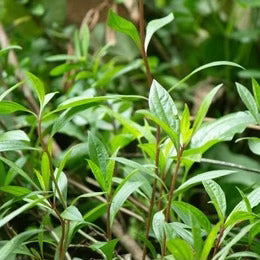Ayapan is a perennial evergreen plant that originated in South America. Additionally, Puerto Rico, Hawaii, Brazil, Peru, and Ecuador as well as India grow it. A typical decorative plant with significant medical significance. But in addition to its decorative value, it also has a number of health advantages.
Eupatorium Triplinerve is known as ayapan in Ayurveda. It's a member of the Asteraceae family.
It is a shrub native to the tropical Americas that is also referred to as water hemp. The plant produces long, slender leaves that are used to create herbal extracts for medical purposes. The stem is colorless and has a reddish tint. The corymbose inflorescence's purple, glabrous leaves are present.
General Information
In English, Ayapan is known as Vishalyakarni. It is used to stop open wound bleeding and blood clotting. In bloody diarrhea, bleeding piles, stomach ulcer bleedings, or any other portion of the body, the leaves and stem are advised.
The leaves include volatile oil, ayapan oil, and other compounds. Many chemicals are produced by the plant, including coumarin chemicals, cineol, alpha-phellandrene, alpha-terneol, ayapanin, ayapin, borneol, coumarin, sabinene, umbelliferone, and many others.
Hemarin, a key biochemical extract from this plant, is utilized to create anti-tumor drugs.
Ayapan leaves include a variety of essential oils, coumarins, ayapanins, and ayapin. This plant also contains vitamin C and beta-carotene.
Names
- Sanskrit Name – Ayapama, Ajapama, Vishalyakarni, etc.
- English Name – aypana, aiapana, aiapaina, aipana, cagueña, diarana-guaco, japana, japana-branca, curia, daun panahan, daun perasman, diapalma iapana, sekrepatoe wiwir, pool root, white snakeroot, yapana, Diapana, etc.
- Hindi Name – Ayapan
- Bengali Name – Ayapan
- Malyalam Name - Vishapach, Chuvanna kalyonni, Ayappana, Ayambana
Special Activity
This herb's raw leaf extracts exhibit strong anti-microbial activity. The leaves' essential oils have anti-tumor properties. The leaves also exhibit anti-oxidant and anti-helminthic effects.
Ayapan is a herb that, according to Ayurveda, aids in balancing the kapha and pitta doshas in the body. The control and cessation of bleeding from open wounds are assisted, and the healing and repair of wounds are accelerated.
Classification
- Kingdom – Plantae
- Order – Asterales
- Family – Asteraceae
- Genus – Ayapana
Ayurvedic Properties
|
|
Hindi / Sanskrit |
English |
|
Rasa (Taste) |
Tikta, Kashaya |
Bitter, Astringent |
|
Guna (Physical Property) |
Laghu, Ruksha |
Light, Dry |
|
Virya (Potency) |
Ushna |
Hot |
|
Vipaka (Post-Digestive Taste) |
Katu |
Pungent |
Effects on Doshas
Ayapana has a unique healing impact on the body's pitta energy. It is a powerful herbal supplement that aids in maintaining blood composition within ideal ranges.
Practical Uses
- The body generally detoxifies when using Ayapan. It helps all bodily organs get clean and restore liver function. By doing so, it promotes the renewal of the body's cells and tissues, extending its life span and enhancing its vitality.
- Ayapan possesses antibacterial qualities that aid in the healing of wounds and stop the development of ulcerations.
- Orally consuming it helps stop bleeding in any area of the body. Additionally, it prevents bleeding while assisting with ulcer healing anyplace in the gut. In conditions like gastric and duodenal ulcers, Crohn's disease, IBS, hemorrhoids, anal fistula, etc., it can therefore be quite beneficial.
- Ayapan is excellent for colon cleansing; its pitta shamak qualities aid in preventing colitis and intestine irritation. When the intestines are clear and healthy, the skin improves and abdominal disorders such as acidity, gastritis, and bloating are readily relieved. It can be administered to the patient even if they have severe abdominal distension, such as ascites.
- Ayapan leaves include characteristics that help to naturally treat fever, cough, and cold.
- To treat malarial fever, whole plant parts such as the stem, leaves, and roots can be put into a decoction.
- A sterile paste of Ayapan leaves can be particularly useful for insect bites, wounds, and internal or external bleeding.
- The fresh juice of this plant's leaves can be used to treat oral health issues like gingivitis and stomatitis.
- For treating female menstruation abnormalities, ayapan is a fantastic solution. This characteristic of the plant is explained by the body's pitta-pacifying effects. The herb's overall calming impact aids in hormone regulation and enhances the female reproductive system.
- Studies in the lab using this plant's leaf extracts have revealed significant anti-fungal and anti-microbial activities.
Caution
People who take blood thinners should avoid ayapan. The leaves contain coumarin, a highly fragrant compound with anti-coagulant and blood-thinning actions. In such a situation, people using blood thinners may experience an increased risk of bleeding or stroke.
Due to the herb's strong laxative properties, many users may experience vomiting or diarrhea as a result of its use.
Parts Used
There are therapeutic benefits for the entire plant.
Dosage
Decoction – 15 to 30 ml.

